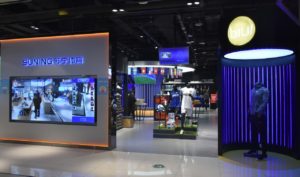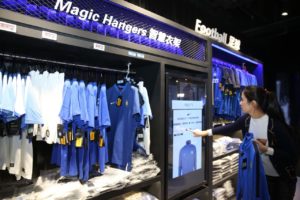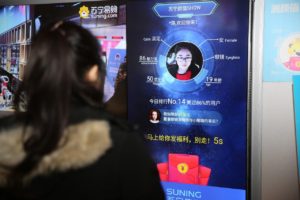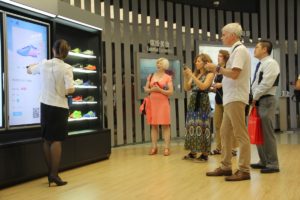 Chinese retailer Suning has rolled out five unmanned automated stores, called ‘Biu’ as the brand steps up its presence in China’s hugely competitive ‘smart retail’ market.
Chinese retailer Suning has rolled out five unmanned automated stores, called ‘Biu’ as the brand steps up its presence in China’s hugely competitive ‘smart retail’ market.
The stores are powered by facial recognition technology, Radio Frequency Identification (RFID), big data analysis and utilise the brand’s online financial services app to provide consumers with a shopping experience that combines the ease of shopping online within a physical store.
Consumers can link their bank card to the Suning Finance app, which allows them to gain entry to the store via the facial recognition technology. Once inside, consumers can browse products ranging from electronic gadgets to sports clothing and accessories, and even groceries. The high-tech stores provide customer profiling to collect data on the consumer’s age, gender and emotional reactions to different products.
Zhou Chen, research director of Suning R&D Centre at Suning Technology Group, told The Drum, the aim is to provide consumers with a highly optimised shopping experience.
“The Suning Smart Recommendation guide system is able to help customers make purchasing decisions in an easier way. The shopping guide is based on machine learning and algorithms to automatically recommend products that fit the needs and preferences reflected by the user’s actions and shopping habits. RFID technology then means products need only be carried along the payment pathway, resulting in an effortless check-out experience taking no longer thansix seconds.”
Since launching its first self-service store in Nanjing in August 2017, Suning has quickly rolled out another four stores in Shanghai, Beijing, Chongqing and a second Nanjing location.
Suning is one of a number of Chinese retail brands that are utilising online-to-offline (O2O) retail experiences to provide consumers with a seamless shopping experience. While Alibaba calls it ‘new retail’ and JD calls it ‘boundaryless retail’, Suning refers to it as ‘smart retail’, and the brand is moving quickly to ensure it is leveraging the technology across its entire business.
While talk of China’s retail market is usually dominated by the e-commerce giants Alibaba and JD, Suning is an established retail giant with significant clout in the market. Suning has over 5,000 bricks-and-mortar stores in more than 600 cities across China and overseas, and it plans to add another 5,000 physical stores to its rapidly expanding empire by the end of this year. Most of its existing stores are already technology-driven and internet-based and by the end of 2018, all will be connected to the brand’s online presence. Suning also has 600 million registered users within its ecosystem
 As the e-commerce rivals race to launch their offline presence, Suning is coming the other way and embedding its technology into its physical stores. It’s a strategy that is already paying off. Last year Suning’s omni-channel sales increased 30% year-on-year to reach RMB 243bn ($38.4bn) while net profits surged 500% to RMB 4.21bn ($665m) and total trading volumes grew by more than 57%.
As the e-commerce rivals race to launch their offline presence, Suning is coming the other way and embedding its technology into its physical stores. It’s a strategy that is already paying off. Last year Suning’s omni-channel sales increased 30% year-on-year to reach RMB 243bn ($38.4bn) while net profits surged 500% to RMB 4.21bn ($665m) and total trading volumes grew by more than 57%.
A recent report from eMarketer revealed Suning, which currently holds a 2% share of China’s hugely competitive e-commerce market, was a growing threat to the dominance of Alibaba’s 58% share. Suning’s investment in technology is helping the brand to gain ground in the Smart Retail market, along with new partnerships such as its deal with Tencent, JD.com and real estate developer Sunac to develop commercial properties which will further integrate O2O retail experiences.
“’Smart retail’ will play a central role in continuing to build on our impressive growth,” says Chen.
“Ultimately, it’s about improving the consumer experience through innovation. For example, another technology revolutionising the consumer experience in our stores is Suning’s ‘Off-Hooking’ system. When shoppers pick up an item from the shelf, the relevant product information is automatically displayed on a screen nearby. This includes user comments on our online shopping platform – together with smart recommendations on similar products.
“So, for example, if a shopper wants to buy a pair of sports trainers and picks up a pair, the two screens beside the display shelf will light up with all the details. The off-hooking system uses RFID, video analytics, button gravity sensors and Bluetooth technology to bind products and sensors. This means when a product is picked up, the basic information is retrieved according to the product code and sensor ID. Information such as pick-up time and popularity are also recorded to inform further improvements.”
Suning’s Biu store showcase a future where big data, robots and logistics will manage the retail market, however, Chen is quick to point out the company is not trying to get rid of physical staff.
“The goal of both ‘smart retail’ and Suning’s Biu stores is not to use machines to replace manual work, but to improve the consumer experience continuously. In our Biu stores, we actually have one to two members of staff, to answer some technical questions from shoppers. However, with technological advancements, we will see more basic questions being answered through AI in the near future.”
 The role of technology is a crucial element to the brand’s future and Suning has invested heavily with six R&D centres in China and Silicon Valley. The company has created products such as Suning’s ‘Magic Mirror’, which provides shoppers with customised Avatar reflections featuring virtual clothes or accessories, and an intelligent fitting room, which enables users to observe their outfits in mock scenarios and locations to help drive purchase decisions.
The role of technology is a crucial element to the brand’s future and Suning has invested heavily with six R&D centres in China and Silicon Valley. The company has created products such as Suning’s ‘Magic Mirror’, which provides shoppers with customised Avatar reflections featuring virtual clothes or accessories, and an intelligent fitting room, which enables users to observe their outfits in mock scenarios and locations to help drive purchase decisions.
“All our research and development focuses on improving the experience for our consumers and benefits for our partners, industries and even society. Indeed, how to bring the tech development into practice to better satisfy and entertain the consumers, and also bring more positive insights and experience to the industry, is always the challenge we keep making efforts to achieve.”
Along with the technology and the experience of the Biu stores, it is also some of the exclusive products that attract consumers, particularly in the lucrative 24-to-30-year-old demographic. Among the most sought-after items are the football club merchandise, particularly the official Inter Milan gear, (Suning owns the legendary Italian team), along with items such as phone chargers and air purifiers.
“The Biu stores cater for advanced consumer demands for better and more stylish living. Being technology-driven, they appeal primarily to a new generation of consumers who attach greater importance to not only convenience but a more refined and aspirational lifestyle,” says Chen.
When Suning first developed its Smart Retail strategy, it charted the evolution of retail from bricks-and-mortar to e-commerce, and then merged the two to create Smart Retail which it believed would supersede the existing model of make-sell-consume to create a new model: the experience-buy-make.
 “Ultimately, it’s about improving the consumer experience and the four As: it serves Anyone who needs Anything, Anywhere, Anytime. But the advent of Smart Retail is also actually about the datamation of all the retail factors including products, logistics, check-out process, and achieving more intelligent sourcing, selling and services, seeing applied technology innovations including omni-channels, internet-of-things (IoT), big data analysis, artificial intelligence (AI), augmented reality (AR) and virtual reality (VR) becoming ubiquitous.
“Ultimately, it’s about improving the consumer experience and the four As: it serves Anyone who needs Anything, Anywhere, Anytime. But the advent of Smart Retail is also actually about the datamation of all the retail factors including products, logistics, check-out process, and achieving more intelligent sourcing, selling and services, seeing applied technology innovations including omni-channels, internet-of-things (IoT), big data analysis, artificial intelligence (AI), augmented reality (AR) and virtual reality (VR) becoming ubiquitous.
“In the very near future, this will enable retailers to anticipate, meet and beat customer expectations by providing diversified and personalised goods and services in various consumption scenarios. An open platform of Smart Retail will also help to optimise supply chain structures, cut production costs, drive efficiency and improve economic benefits for the whole industry.
“We are quickly moving towards a future where truly intelligent smart technology will provide shoppers with personalised products and services in multiple scenarios, from smart self-service shelves and shopping guide robots to drone delivery. It is extremely exciting,” says Chen.
Source: The Drum

You must be logged in to post a comment Login